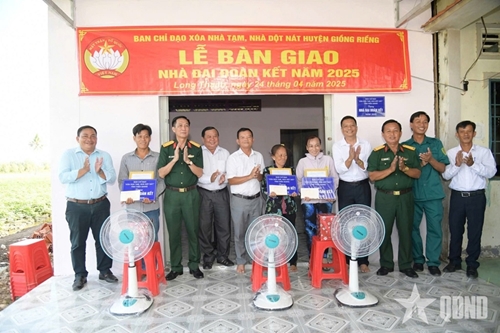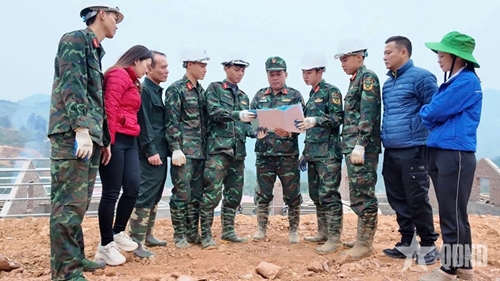    |
 |
|
An Giang’s armed forces assist in building a house for Danh Hong. |
These efforts have not only improved living conditions, but also strengthened the bond between the military and the people and fostered the people’s heart posture.
From makeshift shelter to sturdy home
Danh Hong, a resident of Giong Rieng commune, An Giang province, used to live in a dilapidated shelter with no stable income. His life changed when the An Giang provincial Military Command provided a financial support of VND 60 million, and local authorities and relatives assisted him in building a house. Thanks to that, Hong’s family now enjoys a clean, solid 90-square-meter home.
“This house is a dream that comes true,” he said. “Thanks to the military’s support, we finally have a safe and permanent place to live.”
Stories like Hong’s are becoming more common across Vietnam. Recently, many families in remote or disaster-prone areas have received life-changing support. In Huong Xuan commune, Ha Tinh province, Ho Thi Huong, an ethnic Chut woman, emotionally expressed her gratitude to the province’s border guard at the handover of her new house. “This is the happiest Lunar New Year we’ve ever had. With a proper house, we’re ready to work hard and build a better life,” said Huong.
    |
 |
|
A gratitude house is handed over to a needy family in An Giang. |
The nationwide campaign to eliminate makeshift and dilapidated housing has evolved into a far-reaching movement within the military. It has become a “command from the heart,” a moral responsibility embraced by soldiers and officers alike toward disadvantaged families across the country.
To date, agencies and units in the whole military have contributed to the construction or repair of over 17,000 houses nationwide, with total funding surpassing VND 895 billion, of which the Ministry of National Defense directly supported 11,650 homes, worth VND 601 billion; provided nearly VND 106 billion in housing assistance for some 1,730 servicemen, defense workers, and staff facing housing difficulties; and supported the construction or repair of 3,650 homes through military units nationwide, at a cost of over VND 188 billion.
These newly-built houses not only improve living conditions and ease hardships for vulnerable families, but also become a source of encouragement, instilling their determination to overcome adversity. They also contribute to fostering the bonds between troops and people.
Determination to complete the movement
To effectively implement the movement, agencies and units in the whole military have taken various practical measures to reduce costs and improve the durability and functionality of the houses.
Danh Hong said that although the provincial command provided the funding of VND 60 million, his relatives contributed VND 30 million, he fell short of the construction cost. Fortunately, the An Giang provincial Military Command worked with local authorities to mobilize additional support from organizations, units, officers, soldiers, and local militia force.
Guided by the principle that each home is “a gift,” “a symbol of love,” and “a safe haven,” agencies and units have enhanced dissemination to raise their personnel’s awareness of the significance of the national housing campaign. They have also coordinated closely with local authorities to spread the message to the wider public, helping all citizens understand the campaign’s humanistic and social value and contribute their man-days of labor.
The campaign has been widely integrated into broader initiatives such as “Good mass mobilization” and “The military joins hands to build new-style rural areas,” “The military joins hands to help the poor, leaving no one behind,” expanding its impact across both military and civilian communities. These initiatives have provided timely financial aid to remove makeshift housing and build houses for military personnel, defense workers, and poor or near-poor households lacking adequate shelter or whose homes have been severely damaged by natural disasters.
    |
 |
|
Thai Nguyen’s troops help construct a resettlement area in Nam Cuong commune, Thai Nguyen province. |
At recent conference to review the outcomes of the movement in the military, Deputy Chief of the General Department of Political Affairs (GDp) Lieutenant General Truong Thien To emphasized the importance of unity, coordination, and transparent implementation. He stressed that guiding principles, namely the “6 clear's” (clear people, clear tasks, clear responsibilities, clear authority, clear timelines, clear results) and the “4 real's” (real discussions, real actions, real results, and real benefits for the people) must be upheld.
The GDP’s deputy chief emphasized the need to raise the quality of advisory work, enhance coordination in dissemination, mobilize forces, organization, and individuals to contribute to the Party and people’s efforts in eliminating makeshift and dilapidated houses.
Translated by Tran Hoai